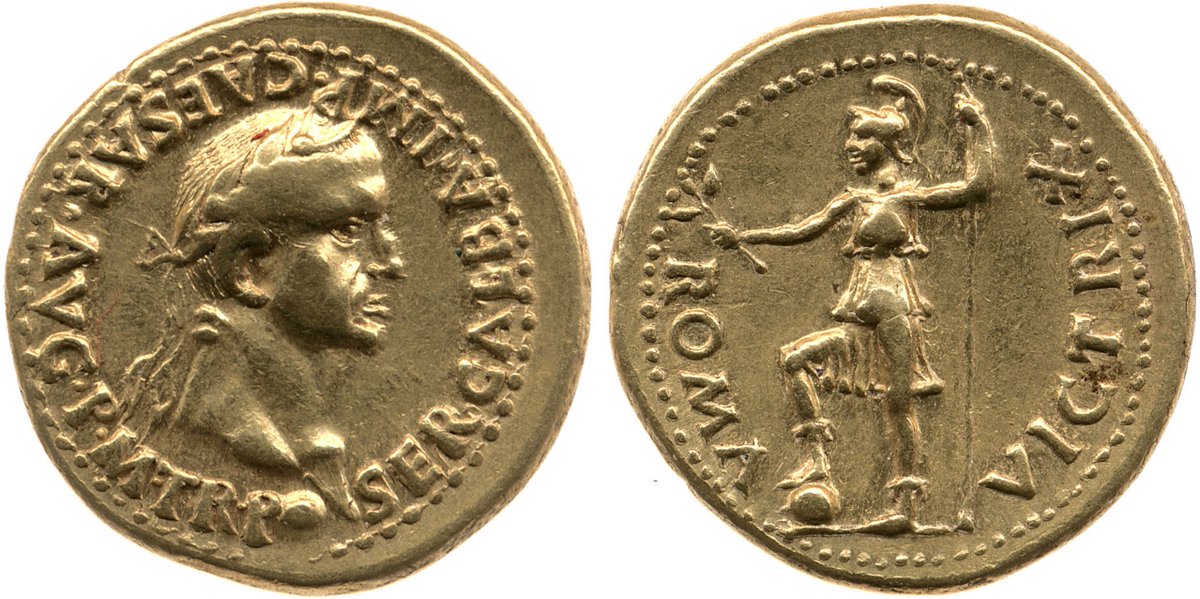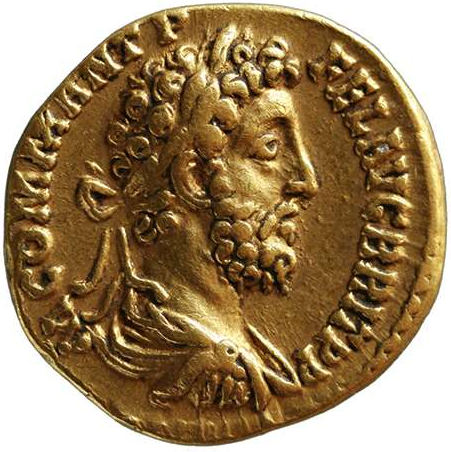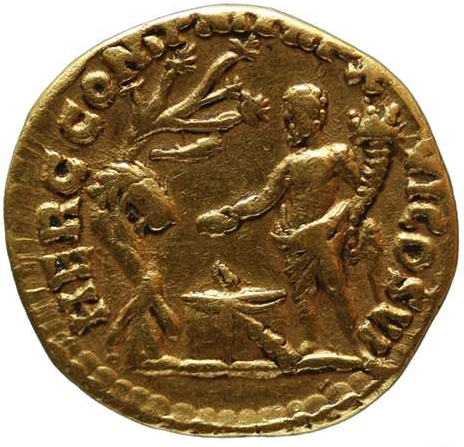
Ancient Coin of the Day: For his birthday, let's use today's thread to take a look at the coinage of Galba, starting with this lovely aureus of AD 68-69 from the mint at Tarraco. #ACOTD #Galba
Image: RIC Galba 40; British Museum (R.6573). Link - numismatics.org/ocre/id/ric.1(…
Image: RIC Galba 40; British Museum (R.6573). Link - numismatics.org/ocre/id/ric.1(…

Although Galba's reign was brief, he at least demonstrated that he understood the power of numismatic messaging. Thus his coinage was well-crafted with powerful messages of righting Rome and putting the empire back on track.
The Obverse of this coin shows a rather severe laureate portrait of Galba with the simple Legend GALBA IMPERATOR - 'Galba, Victorious Commander'. The simple nomenclature here is often cited as evidence that this coin was issued prior to his formal acclamation by the Senate. 

The Reverse shows the personification of Rome, in military dress and carrying a Victory, with the Legend ROMA RENASC - 'Rome rising again'. The messaging here is that of restoration, re-birth, setting Rome back on the military path which had been so fundamental to her... 

...acquisition of empire, but yet perceived as having been ignored and mistreated under Nero. Thus with Galba, or at least such is to be inferred, Rome will be returned to its true nature.
Indeed much of Galba's coinage celebrates military might and endeavour, in a deliberate stress of not only his own qualities, but also the background to his power.
Image: RIC Galba 59; British Museum (R1874,0715.11). Link - numismatics.org/ocre/id/ric.1(…
Image: RIC Galba 59; British Museum (R1874,0715.11). Link - numismatics.org/ocre/id/ric.1(…

The example above is ROMA VICTRIX - 'Rome the Conqueror', with the Obverse Legend SER GALBA IMP CAESAR AVG P M TR P - 'Emperor Servius Galba Cesar Augustus, Pontifex Maximus, with Tribunician Power' - marking this as falling after his official elevation to the Principate.
But, Galba's coins also communicated the cohesion that he felt he would bring to the Roman world. The Legend on this coin CONCORDIA PROVINCIARVM - 'The Harmony of the Provinces - being a good example.
Image: RIC Galba 119; British Museum (R.6579). Link - numismatics.org/ocre/id/ric.1(…
Image: RIC Galba 119; British Museum (R.6579). Link - numismatics.org/ocre/id/ric.1(…

However, 'harmony' was not to be the result of Galba's accession. Indeed, as Tacitus (Histories 1.6) tells us that "his march from Spain was slow and stained with bloodshed", and when he arrived in the city he butchered the marines who had been levied by Nero in his final months.
I love Galba's coinage, as indeed did the Flavians who re-used many of his Reverse designs, but it is fair to say that he "had the qualifications to be a ruler - if only he had not ruled" (Tacitus, Histories 1.49).
For an interesting (re-)evaulation of Galba, see:
Charles, Michael B., and Eva Anagnostou-Laoutides. “Galba in the Bedroom : Sexual Allusions in Suetonius' Galba.” Latomus, vol. 71, no. 4, 2012, pp. 1077–1087.
jstor.org/stable/23800306
#ACOTD #Galba
Charles, Michael B., and Eva Anagnostou-Laoutides. “Galba in the Bedroom : Sexual Allusions in Suetonius' Galba.” Latomus, vol. 71, no. 4, 2012, pp. 1077–1087.
jstor.org/stable/23800306
#ACOTD #Galba
• • •
Missing some Tweet in this thread? You can try to
force a refresh










